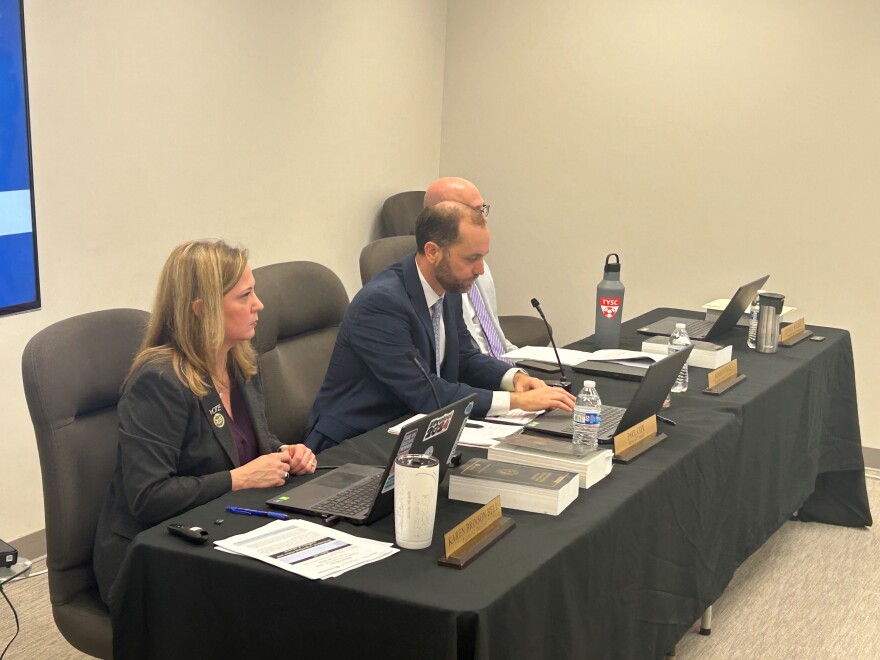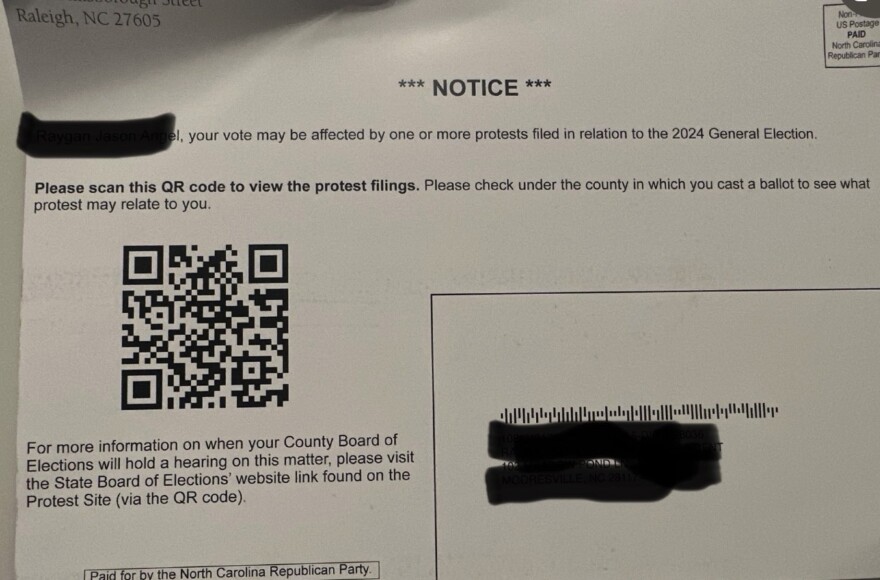The North Carolina State Board of Elections voted unanimously Tuesday to certify the 2024 elections, except for a handful of contests under recount and protest. That includes the race for a seat on the state Supreme Court in which the Republican candidate has challenged the validity of more than 60,000 ballots, including two cast by his opponent's parents.
Republican Jefferson Griffin, a judge on the North Carolina Court of Appeals trails Justice Allison Riggs, the Democratic incumbent, in the race for Seat 6 on the state Supreme Court. But the margin between them— 625 votes — is close enough under state law to require the recount demanded by Griffin.
Griffin's campaign has also filed protests across the state, claiming tens of thousands of ballots should be disqualified for a host of reasons. The claims include ballots allegedly cast early by people who subsequently died before Election Day, ballots cast by people who haven't completed the terms of a felony conviction, and ballots cast by overseas citizens who have not resided in North Carolina but whose parents or legal guardians were eligible North Carolina voters before leaving the United States.
However, the vast majority of ballot protests are aimed at what the Griffin campaign claims are cases of incomplete voter registrations. According to those protests, these ballots should be disqualified because the registration data do not include the voter's driver's license number or the last four digits of their Social Security number.
The basis for this protest is the same as one in a lawsuit filed by the North Carolina Republican Party and the Republican National Committee claiming 225,000 voters should be removed from the state's rolls due to incomplete registration. A Donald Trump-appointed federal district court judge dismissed a main part of that lawsuit in October.
Ever since Congress passed the Help America Vote Act, or HAVA, in 2002, federal law has required the inclusion of either a voter's driver's license number or Social Security number on registration forms. But that does not mean a voter whose registration form does not contain either of those numbers isn't eligible to vote.
In some cases, eligible voters might have registered properly prior to passage of HAVA. In other cases, a voter might have provided the information, but a poll worker might have failed to enter the data. And when a person goes to an early voting site for same-day registration, they could register to vote by providing a HAVA document, such as a utility bill, that does not contain either a driver's license or Social Security number.

Embry Owen, campaign manager for Allison Riggs, called the Griffin campaign's ballot protests a "last-ditch effort to the deny the will of voters across the state." Owen also said the Riggs campaign is confident the recount will confirm the incumbent's slim victory over Griffin.
Owen criticized the North Carolina Republican Party's method of informing voters whose ballots are being challenged by the Griffin campaign. The NCGOP sent out postcards to the individual voters informing them their vote "may be affected by one or more protests filed in relation to the 2024 General Election."

The postcard also contained a QR code for the recipient to view the protest filings and an instruction to "check under the county in which you cast a ballot to see what protest may relate to you."
Owen claimed the postcards have sowed confusion, anger, and frustration among voters who cast their ballots in good faith to make their voices heard.
Among those voters are Allison Riggs' parents, whose ballots are being challenged under the pretext of incomplete registration.
Paul Shumaker, a consultant with the Griffin campaign, said the dramatic turnaround in the vote count over the course of the post-election county canvass is reason enough to warrant the ballot protests.
On Election Night, Griffin led Riggs by around 10,000 votes. During the county canvass—the 10-day post-election period during which local elections boards validate provisional and absentee ballots, conduct hand-eye counts of ballots from randomly selected precincts, and reconcile voter check-in data with ballots cast—that lead flipped to a 625-vote edge for Riggs.
Shumaker, a GOP political consultant for more than 40 years in North Carolina, said that change was the most drastic, and unexpected, turnaround he has seen in his career. He called it "very troubling" and said the Griffin campaign has every right to pursue a legal remedy.
County elections boards are handling ballot challenges involving alleged cases of votes by people serving a felony sentence and voters who died after casting their ballots.
The State Board of Elections will handle protests alleging incomplete voter registration and claims involving allegedly ineligible overseas citizens.
According to Riggs campaign manager Embry Owen, the state elections board will hear the protests under its jurisdiction the week of Dec. 9.


